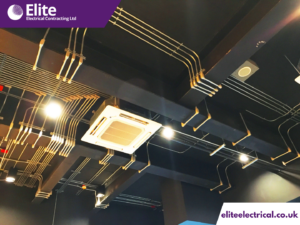Smart Grid Technology: What It Means for the Future of Electrical Infrastructure
As the demand for electricity continues to grow, the need for a more reliable, efficient, and sustainable energy infrastructure has never been more pressing. Smart grid technology represents a revolutionary advancement in how we generate, distribute, and consume electricity. By leveraging cutting-edge digital technologies, smart grids promise to transform the future of electrical infrastructure.
What is Smart Grid Technology?
Smart grid technology refers to an advanced electricity network that uses digital communications and automation to improve the efficiency, reliability, and sustainability of electricity services. Unlike traditional power grids, which rely on a one-way flow of electricity, smart grids facilitate a two-way flow of electricity and information between utilities and consumers. Key components of a smart grid include smart metres, sensors, communication networks, and advanced analytics.
Benefits of Smart Grid Technology
- Enhanced Reliability and Efficiency Smart grids significantly enhance the reliability of electricity supply by enabling real-time monitoring and automatic rerouting during outages. This reduces the duration and impact of power disturbances, ensuring a more stable energy supply. Additionally, by implementing demand response programs, smart grids can lower peak demand and alleviate pressure on the grid, resulting in increased efficiency
- Cost Savings The implementation of smart grid technology reduces the operational and management costs for utilities. These savings are often passed on to consumers, resulting in lower electricity bills. Smart grids optimise resource allocation and enable remote monitoring and control, which further contributes to cost reductions
- Environmental Impact Smart grids play a crucial role in integrating renewable energy sources into the electricity network. By efficiently managing energy from sources such as solar and wind, smart grids help reduce reliance on fossil fuels and lower carbon emissions. This promotes a more sustainable and environmentally friendly energy system
- Energy Security The integration of advanced monitoring, encryption, and access controls enhances the security of the energy infrastructure. Smart grids bolster energy security by protecting against cyber threats and unauthorised access. Moreover, they support energy independence through the use of local generation and storage solutions
- Consumer Empowerment One of the significant advantages of smart grids is the empowerment of consumers. With smart metres and real-time data, consumers can monitor and manage their energy usage more effectively. Financial incentives for reducing consumption during peak periods encourage energy conservation and cost savings
Impact on Energy Distribution and Management
Smart grids optimise energy distribution by balancing supply and demand in real time. They facilitate the integration of renewable energy sources, ensuring that clean energy is efficiently distributed across the network. The management of distributed energy resources (DERs), such as rooftop solar panels and electric vehicles, is streamlined through smart grid technology In the UK, several innovative projects are demonstrating the potential of smart grids in transforming energy distribution and management (GOV.UK).
Case Studies and Examples
In the UK, numerous smart grid initiatives are underway, showcasing the benefits and potential of this technology. Projects like the heat network in Gateshead and the trial of battery technologies in Oxford are leading the way in integrating smart grid solutions These initiatives not only enhance energy efficiency and reliability but also contribute to the UK’s goals of reducing carbon emissions and promoting sustainability.
Challenges and Considerations
Despite the numerous benefits, the implementation of smart grid technology comes with challenges. Initial costs and investments can be significant, and upgrading existing infrastructure requires careful planning. Additionally, technical challenges, such as interoperability and data management, need to be addressed. Privacy and cybersecurity concerns also pose challenges, necessitating robust measures to protect sensitive data and ensure system integrity.
Conclusion
Smart grid technology holds immense potential to revolutionise the future of electrical infrastructure. By enhancing reliability, reducing costs, and promoting sustainability, smart grids offer a pathway to a more efficient and resilient energy system. Embracing smart grid technology is essential for building a sustainable energy future that meets the demands of the 21st century.
For further information or to discuss how Elite Electrical Contracting Ltd can assist with smart grid technology, please contact us. You can fill out the contact form on our page, or reach us directly
Address: 30 Upper Mulgrave Road, Sutton, Surrey, SM2 7BD
Phone: 020 8644 3200 / 020 8644 3300
Email: [email protected]







